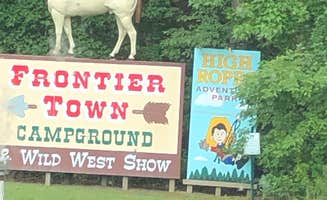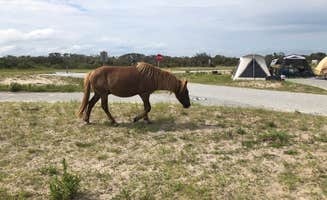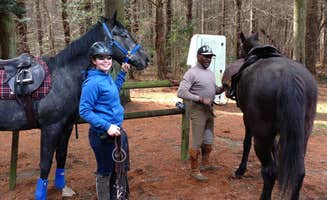Equestrian camping options near Seaford, Delaware extend beyond the immediate vicinity, with several campgrounds offering trail access for riders within a reasonable drive. Located in the southern portion of Delaware where the Nanticoke River flows through forested lowlands, this area has an average elevation of just 26 feet above sea level. The flat terrain creates ideal conditions for beginning equestrian trail riders, though seasonal flooding can make some trails impassable during rainy periods in spring.
What to do
Trail riding near waterways: Tuckahoe State Park Campground offers 20 miles of hiking trails that are also open for biking and horseback riding. "There are a few trails here. Nearby is the Chesapeake bay with all its amenities, an Arbouretum that is a bit over priced. And access to the Tuckahoe River for fishing and kayaking," notes reviewer Bill G.
Bird watching while camping: The wetland areas provide excellent bird watching opportunities. At Martinak State Park Campground, one camper noted, "There is a good trail around the campground, not long because it's a small park, but the views of and access to the river are lovely." Riders can observe various shore birds and marsh species.
Beach riding excursions: While not in the immediate Seaford area, Bayside Assateague Campground offers a unique opportunity for horse enthusiasts approximately 60 miles from Seaford. "Beautiful scenery, love the wild horses. Just be careful opening the door, I've been greeted by a few horses!" writes Joe B. This location allows visitors to observe feral horses in their natural habitat.
What campers like
Private sites for trailer setups: Campers with horse trailers appreciate secluded sites. "The camp sites are spaced out a good amount so each site has good privacy," notes one Blind visitor about Blackbird State Forest Campground. Though currently closed to camping, this review indicates the previous availability of spacious sites suitable for larger rigs.
Clean facilities after rides: "Bathhouses are kept clean," mentions Bill F. about Martinak State Park. This matters significantly for equestrians who need reliable shower facilities after dusty trail rides. "Reasonably clean, especially being so close to the ocean," another camper notes about facilities near riding areas.
Manageable terrain for horses: The flat, sandy terrain in many camping areas provides good footing for horses. At Blackbird State Forest, one visitor mentioned, "Each site has a fire pit, a grill, and two tables with a decent amount of space," which could accommodate portable horse containment systems that responsible equestrians bring along.
What you should know
Reservation requirements: Most parks require advance reservations, especially during peak season. At Trap Pond State Park Campground, one reviewer cautions, "No check in before time. We were there Halloween so all sites full." Plan ahead if bringing horses, as special arrangements may be needed.
Seasonal closures affect trail access: Many campgrounds have limited operating seasons. According to park information, Tuckahoe State Park operates only from March 25 to November 27, which means winter equestrian camping options are extremely limited.
Limited horse-specific amenities: None of the campgrounds in the region advertise dedicated horse facilities like corrals or equestrian campsites. Campers must bring portable containment systems. "Horseriding is encouraged," notes one camper about Blackbird State Forest, but adds that mosquitoes are "relentless," which can be problematic for both horses and riders.
Tips for camping with families
Engaging activities for non-riders: EA Vaughn Wildlife Management Area offers "Lots of trails" according to Wayne L., making it possible for some family members to hike while others ride. However, he warns, "Pretty busy with Hunters during the season," so wearing bright colors is essential during hunting seasons.
Playground accessibility: Several campgrounds offer play areas for children who aren't riding. At Trap Pond State Park, "If you have kiddos, try and get a site in Loop A – there is a nice and educational play area (plus a game I'd never heard of– Gaga ball)," suggests Lee D.
Wildlife viewing opportunities: Children can enjoy observing local wildlife while adults prepare horses. "A deer hung out by the campfire at night, and in the morning there were horse tracks all over the sight," describes Jodi J. about the Bayside Assateague experience, creating memorable moments for young campers.
Tips from RVers
Site selection for large rigs: When traveling with both horses and RVs, site dimensions become critical. "Sites are fairly spacious and have an interesting semi-circle pull through layout so backing in not required. They are not level and have a sandy base so it took a bit of work to finally get the rig level, even with auto-levelers," writes Jim G. about Trap Pond State Park.
Utility access considerations: Many campgrounds have limited hookups. At Tuckahoe, a reviewer noted, "This campground is wooded and only has electric hookups available. The sites are well spaced. Good dump station and potable water fill." Plan accordingly for water needs if bringing horses.
Seasonal weather preparedness: Wind can be an issue when camping with horses in this region. One RVer at Delaware Seashore State Park Campground shared, "The winds were nuts and over 50mph. We switched sites to spare our slide side, so caution to look at windy before going." Wind can make horses nervous, so check forecasts before planning rides.





